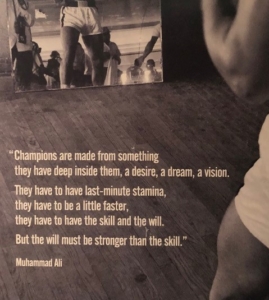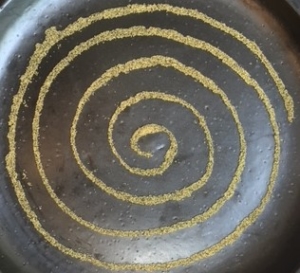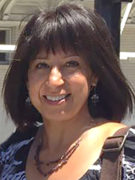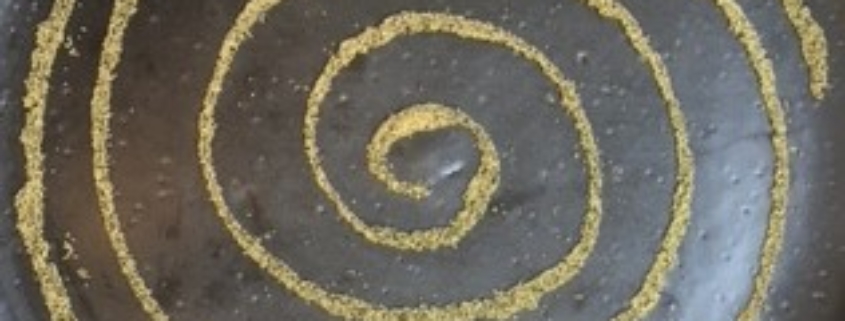Bending the Spectrum

A four-letter word that ends in “k.” That’s how my friend, Kristi, used to refer to the color pink. In her youth she was a competitive swimmer, because it was the one sport open to both boys and girls. She writes: “A touch with the fingertips on the kicking feet of the swimmer in front of you necessitated a shift in position at the next wall. Let the faster person go ahead. Face down in frothy water, the swimmer does not know if the feet or fingertips belong to a boy or girl.” She quotes Simone de Beauvoir and writes about her experiences in hyper-masculine work environments. From her youth onward, Kristi’s determination to not lose, even when she doesn’t win, reminds me of my older daughter, whose attitude is exemplified in the words of Muhammad Ali, on a framed poster in her bedroom: “the will must be stronger than the skill.”
Kristi is a graduate student at Antioch, like me, and I became familiar with her memoir writing when we were assigned to the same workshop groups for two consecutive residencies. Each of her sentences is an arrow, expertly guiding us through unfamiliar terrain. She didn’t even try to hide her discomfort when we requested more details about her personal life, so we could figure out what drives her, what kindling lit the fire within. She reminds me of my younger daughter who told me when she was in high school, that she hated emotions―“they just get in the way.”
I preferred to dress both of my daughters in yellow when they were babies.
Kristi says of her relatively affluent, white family “Outwardly, our family―my mother, father, older brother, and me―looked good.…In grade school, my mother stayed in bed until after I left to catch the school bus. My father was chronically away on business.…he vented his frustrations on me with a belt. …Though I did not fight back much as a kid, I never really gave in either.”
At the age of sixteen Kristi worked “to pay for [her] own clothes, car, and gas.” She states that a few days before turning eighteen “my father matter-of-factly told me that if I was still at home the following week, my ‘shit would be on the sidewalk.’” When she was offered a place at the University of Southern California, her dream (private) school, her parents refused to co-sign the loan she would have had to take on, in order to attend. So she went to the nearest public state university instead.
But these are not the details she wants the reader to dwell on; her memoir is a powerful, riveting account of her quarter century as an officer in the Marines.
When I read Kristi’s first workshop submission in the comfort of my home I learned that she was on the opposite end of the political spectrum to me, and I reflexively thought I didn’t like her. But I was able to separate her admirable writing skills from her political position. Having lived and worked in the Republican stronghold of Orange County, California, for many years, I have often found myself in the company of those who lean to the political right. In these circumstances I have been forced to focus on appealing personality traits, such as a sense of humor, generosity, and kindness. But these people remained colleagues or acquaintances; I never thought of any of them as potential friends.
* * *
Growing up in working-class England, my father repeated the phrase “You can do whatever you like after marriage” ad infinitum. This was the carrot on the end of his authoritarian stick. I had no critical-thinking skills with which to conclude that this was clearly a lie; my mother remained without autonomy in her married life. My three sisters and I were taught to obey, without question―to be silent―that was a cultural axiom, especially for females. Society had tasked my father with ensuring we remained virgins, so that our marriages could be arranged with ease. He also had to provide dowries for each of us; tradition made no exception for laborers, like him. For a perfectionist who takes responsibility very seriously, the odds must have seemed stacked against him in this new environment, in which females had freedoms that shredded the only worldview he knew. He tried to instill in us the discipline he had acquired in the Indian Army from the age of fifteen onward. And he watched us like a zealot, to curb the slightest infraction before we could bring ignominy to his door. But when we failed at preserving the family izzath (honor) he tried to beat it out of us.
* * *
I started a petition on www.change.org in 2016 to boycott the presidential debates because they’ve been hijacked by the Democratic and Republican Parties, through a private corporation, the Commission on Presidential Debates, which controls every aspect, from who will be allowed to participate, to which questions may be asked by a moderator. This was why there was no participation from independent candidates like Jill Stein (Green Party nominee) and Gary Johnson (Libertarian Party nominee). My petition went nowhere. But as Dr. Maya Angelou famously said “We may encounter many defeats but we must not be defeated.”
 In the days following the November 2016 local and national elections I was devastated and consumed with righteous anger; I saw white privilege abound, and I wanted to know which of the fuckers I encountered everywhere had voted for Trump (I knew who some of them were from their yard signs). They weren’t all white. I had volunteered for Bernie Sanders, and even though the Democratic Party establishment sabotaged his campaign in the primary, I still voted for Hilary Clinton, because I knew she would be infinitely better than Trump. (Also Noam Chomsky told us we had to hold our noses, but vote for her nevertheless.)
In the days following the November 2016 local and national elections I was devastated and consumed with righteous anger; I saw white privilege abound, and I wanted to know which of the fuckers I encountered everywhere had voted for Trump (I knew who some of them were from their yard signs). They weren’t all white. I had volunteered for Bernie Sanders, and even though the Democratic Party establishment sabotaged his campaign in the primary, I still voted for Hilary Clinton, because I knew she would be infinitely better than Trump. (Also Noam Chomsky told us we had to hold our noses, but vote for her nevertheless.)
Towards the end of my first residency in December 2016, Antioch had begun to feel like home, and I was relieved and grateful to be among fellow progressives, especially as we brainstormed ideas for our collective responses to our new political reality. When I realized there were students enrolled in the MFA program who were on the right of the political spectrum, the oasis I had treasured for one semester felt contaminated.
* * *
After marriage, I did have more freedom in my in-law’s house, but I didn’t find the loving, nurturing family I desired. These bonds developed many years later, after my husband and I had moved to the US, when we finally had an opportunity to be a family of only four.
* * *
Kristi sought the advice of a former professor before applying to the Marine Corps Officer Candidate School: “He was a man whom I looked up to, who was brilliant, who saw things with a straight and unemotional focus….He made a comment that I did not understand at the time, but his insight resonates with me a quarter century later: ‘You’ll probably like the Corps; you’ve always wanted to be part of a family.’”
* * *
Antioch has been my home, and everyone there is family. That includes the students who identify as being right wing. An aspect of my culture that has been admirable in theory but sometimes onerous in practice is the expectation that I will be welcoming to everyone who enters my home and I will treat each person with respect. Unconditionally. And for the duration of their stay. At the recent June residency I realized that I have very little time left, before I leave Antioch, to make amends to those students I have avoided, for the most part.
* * *

At the end of the book There’s a Pattern Here and It Ain’t Glen Plaid, is the following statement regarding the author: “Humorist and short-story writer, Laurie Frankel, knows pain is the root of all comedy and is thrilled her life is so damn funny.” My family of origin is the gift that keeps on giving; unfortunately, it didn’t come with a receipt. Sometimes when I worry that my writing will generate negative attention I remember that fortunately, I’ve been forged in the fires of negation and conflict. This is why I’m very careful when choosing friends, and political alignment has been a major criterion. But my attitude has been changing. Slowly. I’m still deeply saddened and troubled by all the Trump administration appointees, nominees, and policies. But I can’t live in a constant state of outrage, fueled by Democratic Party institutions that are seizing this opportunity to simultaneously fund raise and further polarize the electorate.
Focusing on someone’s voting record and using that as a reason for their vilification plays into the mass-manipulation strategy of divide and conquer. I can’t dismiss wholesale everyone who does not agree with me politically. I’ve been learning to separate individuals from their votes. 62 million Americans voted for Trump. 90 million Americans did not vote. We have a lot of work to do. Together. Perhaps this is an unexpected, additional lesson that Antioch is trying to teach me, if I can open myself up to it; to see others as glorious and multi-faceted, with political ideology being just one aspect of the whole.
* * *
At this past June residency I looked for Kristi towards the end of the evening on the MFA night out. As we chatted I told her about the tradition of taking the party to Tattle Tale, a karaoke dive bar in Culver City. (Yes everyone, this is a thing!) She wasn’t enthusiastic about the extension to the evening, but I managed to persuade her to come along: “I don’t think I’ll be staying for too long either,” I said. Previously I’d had to wait until after I’d had a couple of drinks before I could even contemplate putting my name down on the list to sing. Then by the time it was close to my turn, I was ready to leave because it was already after midnight (phew!). This time, when I arrived, a new friend, Sara, declared that she had already signed us up for a duet.
“Oh yeah?” I said nervously, “What are we singing?”
“Wannabe by the Spice Girls,” she answered.
“Okay sweet!” I responded, as I headed for the bar to start drinking. Our turn came up really quickly, and when Kristi volunteered to take a video of our performance on my phone I told her I hadn’t thought of doing that, but it seemed like a good idea.
Soon after eleven, Kristi said she was heading out; she’d already agreed to give me a ride back to my Airbnb. I told her I was going to stay, as usual, and I was glad she’d decided to join us.
The next day I posted the video on our family forum. My daughters were thrilled their mom was enjoying the real student experience and my husband said he’d always wanted to marry a rock star. A couple of days later, I told Kristi about my family’s responses to the video she had taken, and she shared her experience in Bernadette Murphy’s seminar, which required literal cutting and pasting of a narrative; “They ran out of scissors,” she said, then added, smiling, “But I had two knives in my bag.” “Of course you did,” I laughed.
* * *
I have no ulterior motive in my friendship with Kristi. It will not diminish my goal of remaking the world so that it works for all of us, especially the most vulnerable. As Jim Hightower (America’s #1 Populist!) says, “Everybody does better when everybody does better.” And I’m not trying to change her political position. In fact, I don’t even want to discuss the issues at stake; I came to the conclusion some time ago that to engage in debate is futile, when we cannot agree on the facts. But then again, at the first residency workshop with Kristi I told her I wanted to see the movie of her memoir, and now that I can list ‘rock star’ on my résumé, perhaps I could audition for an acting role in that movie.
(I obtained Kristi’s permission to quote from her memoir, and her approval of this post.)
 Sarita Sidhu is a nonfiction writer and an MFA candidate at Antioch University Los Angeles. She has worked as a teacher and an advocate of Fair Trade for many years.
Sarita Sidhu is a nonfiction writer and an MFA candidate at Antioch University Los Angeles. She has worked as a teacher and an advocate of Fair Trade for many years.





